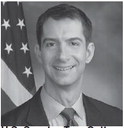Supporting Sheltered Workshops

Supporting
Sheltered Workshops
Over the last year I have visited many Arkansas businesses that are classified as sheltered workshops— organizations or businesses that employ people with special needs—to learn more about the important role they serve in our communities. Sheltered workshops receive waivers under Section 14c of the Fair Labor Standards Act, allowing them to create special working arrangements for persons with disabilities who would not be able to find jobs at market rates. Organizations that receive these waivers are non-profits with a mission to help persons with disabilities.
In Arkansas, we have many of these workshops including the Mid-Arkansas River Valley Abilities Workshop — also called MARVA — in Russellville, Abilities Unlimited in Hot Springs, and the Honeycomb restaurant in Arkadelphia. During my visits to each of these workshops, I met and heard from some truly amazing people.
At MARVA, I spent time with Mike who was diagnosed with cerebral palsy at the age of two. He was lucky enough to have parents who took him to the best schools and the best physical therapy, but they saw real limitations from his disability. For Mike, MARVA has been a saving grace. His mom said it's a safe environment for him to grow as a person, it’s given him purpose, and provided him with a tremendous network of friends. Regrettably, changes to the enforcement standards of section 14c and other Department of Labor regulations are threatening to shut down these important organizations. Sheltered workshops are a true blessing to their client-workers, their families, customers, and all Arkansans. We simply cannot afford to lose them. I'm committed to protecting them from any effort to close them down. In the coming months, I will work with my colleagues to introduce legislation to protect organizations like the Honeycomb restaurant. We must maintain a wide array of employment opportunities for persons with disabilities, and preserve an individual's right to choose an appropriate working environment.

By U.S. Senator Tom Cotton


Share